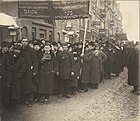Vladimir Medem
Vladimir Medem | |
|---|---|
 Picture of Medem from the Medem Library in Paris | |
| Born | 22 July 1879 |
| Died | 9 January 1923 |
Vladimir Davidovich Medem, né Grinberg (Template:Lang-lv, Template:Lang-ru; 30 July 1879 in Liepāja, Russian Empire – 9 January 1923 in New York City), was a Russian Jewish politician and ideologue of the Jewish Labour Bund. The Medem library in Paris, the largest European Yiddish institution, bears his name.
| Part of a series on |
| Bundism |
|---|
 |
| 1890s to World War I |
|
| Interwar years and World War II |
| After 1945 |
|
| People |
| Press |
| Songs |
| Associated organisations |
| Splinter groups |
|
| Categories |
Life
Son of a Russian medical officer who had converted from Judaism to Lutheranism,[1] Vladimir Medem was educated in a Minsk gymnasium. He studied later at the Kiev University and developed an interest in the Yiddish-speaking proletariat and their harsh living conditions. He was preoccupied by the fact that the Russian Jews had no nation and no right to strike. In spite of his interest in Jewish affairs, Medem did not re-convert to Judaism.
Medem only learned Yiddish at the age of 22; the language was taboo in his family environment. Because of a student strike in 1899, he had to leave the university and joined the Minsk socialists, inspired by Marxist friends. His great interest in the world of Yiddish-speaking workers and the political antisemitism made him the leading ideologue of the Jewish Labour Bund, whose supporters were especially well represented among the immigrants in Paris, and were also called Bundists. Medem emigrated to New York in 1921 and died less than two years later. He is buried at the Mount Carmel Cemetery in Queens, NY.
The Jewish Labour Bund, founded in 1897 in the Lithuanian Vilnius, was committed to the cultural and national rights of Jews in Eastern Europe. In this regard, Medem dared to oppose the view of Russian Marxists, and even of Lenin. These objectives received support in Central and Western Europe, e.g. from Austromarxists, and especially in several Jewish immigrant workers' clubs in Paris, whose members described themselves as Bundists. One such club, which also saw the education of the workers as its main task was given the name Arbeter-klub afn nomen Vladimir Medem (Workers' Club on behalf of Vladimir Medem). His educational policy ambitions culminated in 1929 in the founding of the Medem Library, which at 30,000 volumes is now the largest Yiddish cultural institution in Europe.
Main writings
- 1916: The doctrine of the Bund
- 1938 (posthumous): Template:Lang-yi (Hg. Gros, Naftole; Gros, Naftoli). Verlag Kinder-Ring, 87 S., illustrated; reedited by National Yiddish Book Center, Amherst, Mass. (USA) 1999. Collection: "Steven Spielberg digital Yiddish library" No. 06827
See also
References
- ^ "YIVO | Medem, Vladimir Davidovich". www.yivoencyclopedia.org. Retrieved 2016-12-09.
External links
- Vladimir Medem in the German National Library catalogue
- YIVO Encyclopedia of East European Jewry
- A photo of the graves of Vladimir Medem, Sholem Aleichem, Morris Rosenfeld and others at the Mt Carmel Cemetery: [1]
- Vladimir Medem (1 June 1979). Vladimir Medem, the life and soul of a legendary Jewish socialist. Ktav Pub. House. ISBN 978-0-87068-332-9.
